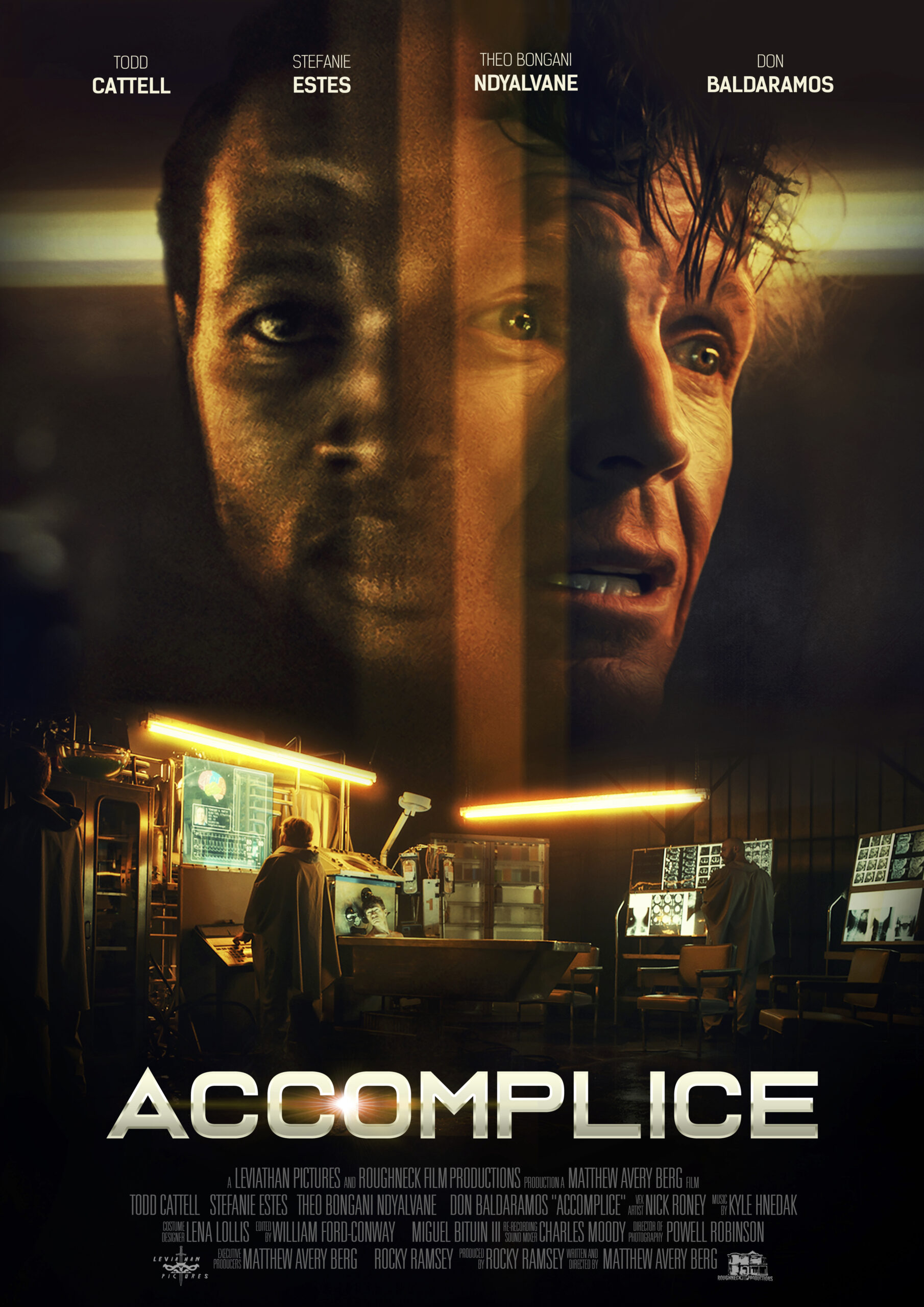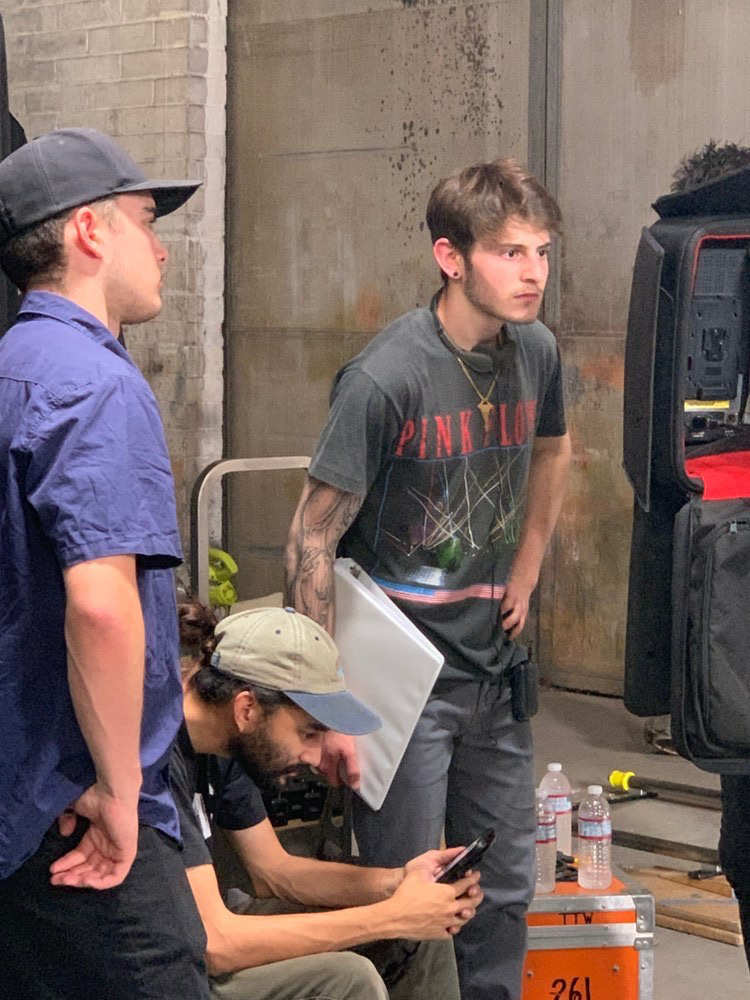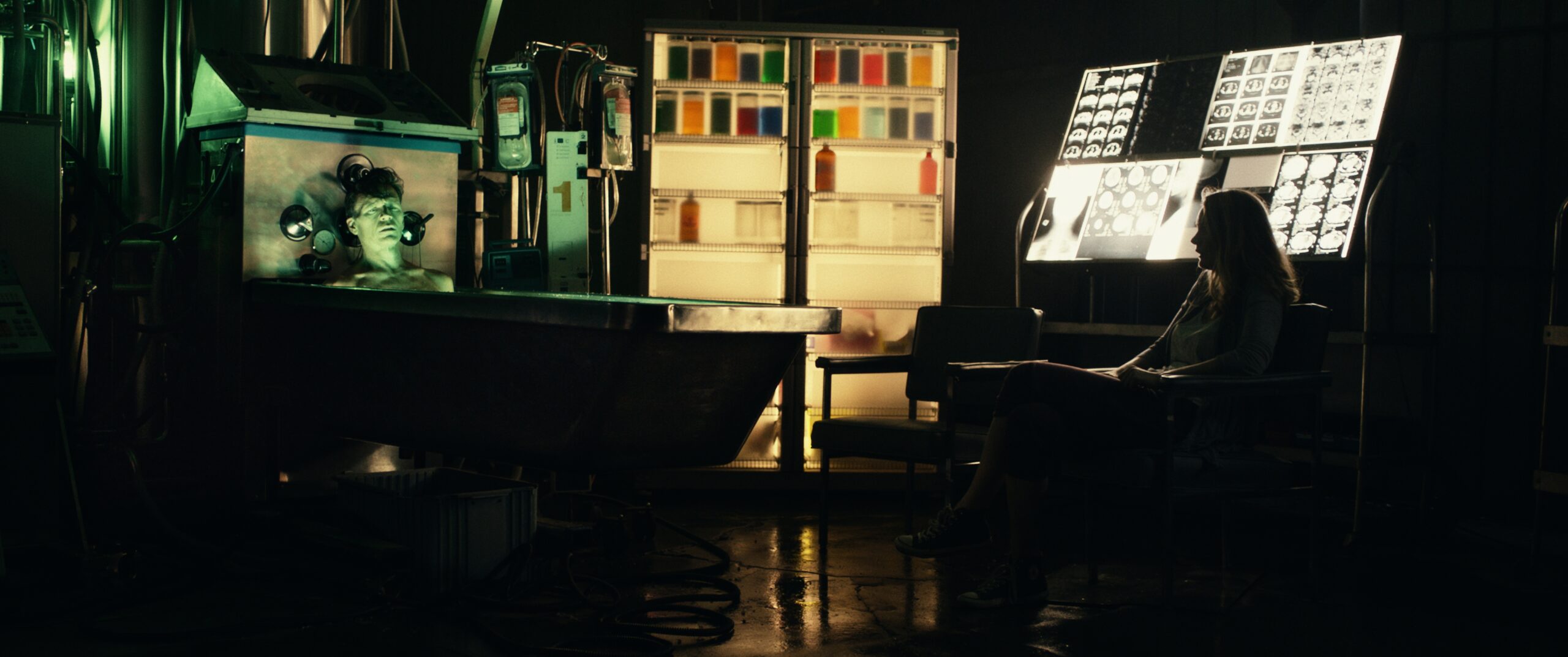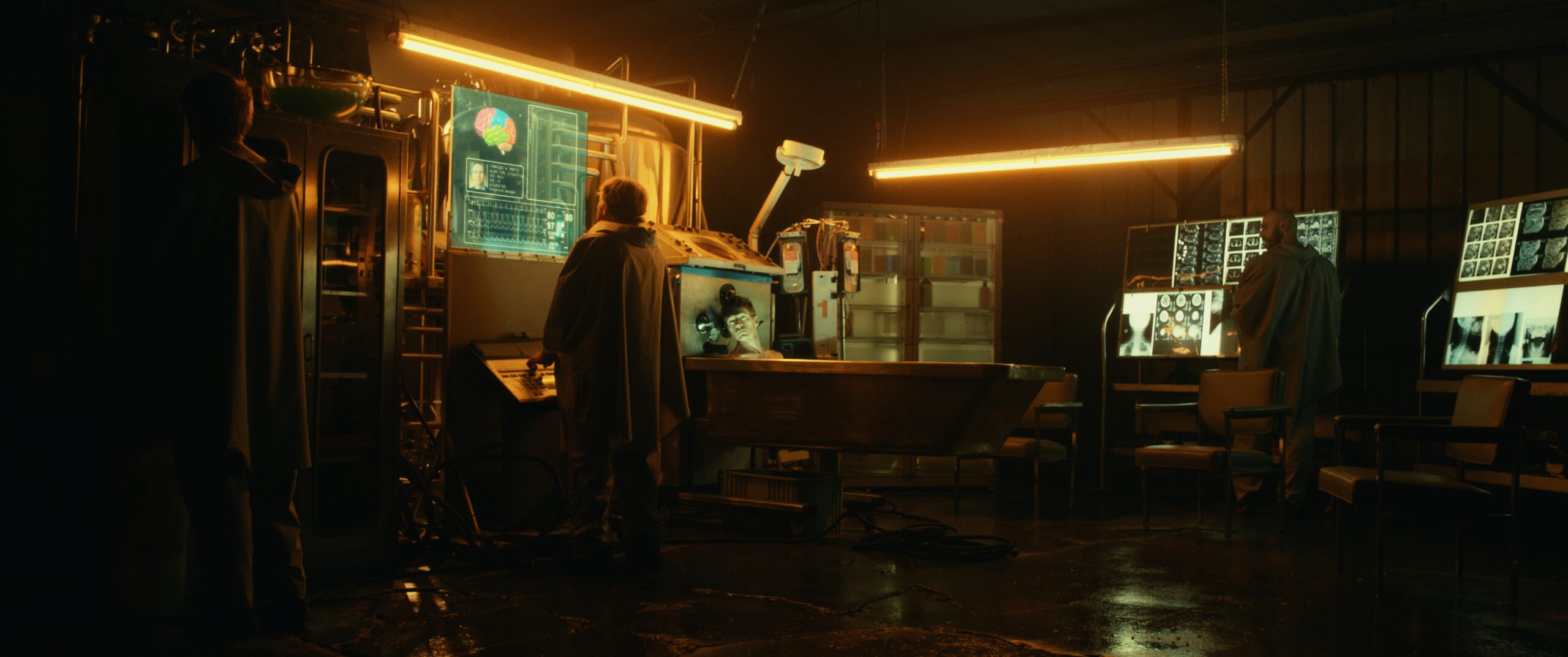Science fiction has a unique ability to drop audiences into a futuristic or unrealistic world and make us think beyond the realm of our everyday existence. In writing and directing his sci-fi short Accomplice, however, NYFA alum Matthew Avery Berg drew from a real, personal crisis to create his fictional story that takes place in the distant future. Crickett Rumley, NYFA’s Director of Film Festivals, spoke with Matthew as the film became available for online streaming as an official selection of the National Film Festival for Talented Youth (NFFTY), running October 23 – November 1, 2020.
Crickett Rumley (CR): Congratulations on getting into NFFTY! Tell us more about Accomplice.
Matthew Avery Berg (MAB): Accomplice is about a man who’s forced to experience the memories of the person he accidentally killed. It takes place inside a medical compound in the year 2067. The sci-fi elements are obviously not inspired by true events; however, the underlying story is. Following my first surgery, I was constantly on opioids for a week. Being doped up for that long disassociated me from reality and my own mind. I’d start speaking to myself like I was two different people. However, it also led me to reflect on my life. I’d whisper confessions and admit things that I had been in self-denial about.
Accomplice follows a man whose mind is inhabited by two different people following surgery. The new person in his head forces him to do an introspection on both their lives. It allows the protagonist to finally acknowledge his guilt the same way recovering from surgery had forced me to recognize my own…over way less dramatic things though, of course.

My direction of the film was shaped by the health issues I was dealing with while still raising the financing. The prior summer, in 2018, I had progressively become more nauseous each night. Soon I realized that whenever I closed my eyes and avoided light my nausea improved. This feeling, which had previously only lasted a few hours at night, had become a 24/7 occurrence. I couldn’t sleep, couldn’t eat. I lost fifteen pounds in two weeks. Before undergoing an MRI, I concluded that I was dying. I was relieved to learn that I had a benign cyst in my brain. Yet, disturbingly this clue only brought more mystery and fear as I grew too sick to walk. Finally, doctors discovered that I suffered from a rare condition called “status migrainosus.” Essentially, an everlasting migraine.
Despite the diagnosis, no neurologist could provide a cure. I took steroids and tried a variety of medications, but as some symptoms disappeared, others emerged. Two weeks later, I experienced constant vertigo, tingling throughout my body, and unbearable indigestion. I spent each day trying to distract myself until I could be sedated in hopes of waking up better the next day. This cycle continued for months, forcing me to postpone shooting an earlier version of my film.

CR: That sounds so painful and challenging. How did this crisis impact your work on the film?
MAB: It dawned on me there was not much difference between this character suffering from external and intruding memories and me battling these strange ailments. I rewrote the script to incorporate the way I dealt with my pain as a sci-fi thriller.
Six months later, in every meeting with the cinematographer, we used the word “migraine” almost as much as “camera.” I instructed him which parts I wanted to feel like a migraine. In one scene, I inserted flashing lights. In another scene, I added other bright lights, and in additional scenes, we used a handheld to simulate vertigo.
CR: What was your favorite thing about making this film?
MAB: Seeing the (almost) finished film for the first time on the mixing stage was my favorite thing about making this movie. Although the VFX had not been added in and the color wasn’t confirmed, it was amazing to see what I had been trying to get made since sophomore year of high school play on a big screen for the first time. My producer, who had been very critical of the project up until that point – as was his job – whispered during the fade to black, “that’s awesome”. It took me a second to realize he was talking about our movie. I don’t care what anyone says, nothing is more satisfying in the process of making a film than seeing the finished product.
CR: What was the most challenging thing about making the film? What did you learn in the process?
MAB: I’d say the biggest challenge was being able to film a high-quality production with as many moving pieces and locations as this project had written. High concept sci-fi is not meant for a short film budget. I was having to rewrite in my head while we were shooting to make our tight schedule and budget work. Although I accomplished what I had set out to, there is a reason I kept my latest project to just two people in a tattooing session. While I do not believe films should be written for the sake of accommodating their budget, I now definitely think about how much a concept could cost to produce before choosing to write it. If you write an amazing space-traveling epic, you’re only doing your story a disservice by making it for $10,000.

CR: What are you looking forward to in your screening with NFFTY? Are any of their masterclasses or programming looking interesting to you?
MAB: I’m looking forward to being able to interact with my fellow filmmakers in the same age group as me even if online. Everyone I work with tends to be at least nine years older, so I love the idea of being able to meet other people my own age with the same standard of quality to potentially collaborate with. All of the programming and masterclasses at NFFTY look amazing. However, despite what you may assume from watching my film, I’m most excited to watch the Dynamic Duos section. So much of being young and growing up is about the friendships we make and maintain. If there is a genre I feel that youth filmmakers have the most legitimate truth to share in, it is the buddy film.
CR: Which festivals have you been in so far with Accomplice? What was that experience like?
MAB: This has been more than a weird year for festivals. A lot of the festivals have either been postponed or canceled for 2020. However, there have been some other great ones we’ve been able to be a part of so far. We were an official selection at Dances With Films, which had an amazing virtual experience featuring some of the greatest panels I’ve had the chance to listen to. We are also an official selection at FilmQuest and won the shorts category at Buffalo Dreams Fantastic Film Festival. Unfortunately, FilmQuest has been postponed to 2021 and we were not able to attend Buffalo Dreams due to the pandemic. However, I had a student film as an official selection at Cinequest a couple of years ago and highly recommend that one. That festival gets up to 100,000 attendees, and the industry networking events are just one of the amazing aspects of that superb festival. Still waiting for the notification date for that one.
Accomplice was also invited to be part of Hollyshorts’ Monthly Screening Series on Bitpix.
CR: You’ve wanted to be a filmmaker since you were four years old, and you started attending NYFA Tween Digital programs when you were in the fifth grade. How do you think your education and the work you did here prepared you for a career in filmmaking?
MAB: I did the 12-week Saturday program for three semesters, so for 36 Saturdays I would come and take 6-8 hours of classes throughout the school year in all aspects of filmmaking. I would shoot projects on the Universal Backlot as a ten-year-old. In all honesty, my education at NYFA was essential to preparing me as a filmmaker. I learned everything there was to learn about filmmaking without doing it professionally.
With that being said, you don’t learn the other 75% until you get actual experience directing on professional sets.

CR: So true. What have you been up to since then?
MAB: Since I graduated from my high school, Harvard-Westlake in Los Angeles, in June of 2019, I have been writing and directing professional short films. Although I was supposed to go to USC starting this semester, I ended up dropping due to the opportunities I was beginning to be handed. Accomplice started getting me attention from executives in the industry who wanted to mentor me and to fund my projects.
I was offered carte blanche creative control of a fully-financed short film with Academy Award Nominee Eric Roberts, as well as producers inquiring about financing a feature with me directing. I was also being set up with some really big directors to shadow. Although COVID put a halt on the shadowing gigs and the feature offers, I was still able to direct the film with Eric Roberts.
CR: That’s cool! What was the experience like?
MAB: It was a magical shoot. LA Ink’s Dan Smith, a celebrity tattoo artist, and musician was involved with the project and did all our tattooing inserts. Richard Patrick of Filter and Nine Inch Nails is slated to compose for it. It’s so awesome to be working with someone who I grew up listening to. The producer on the project is R. Andru Davies whose last feature film with Karen Gillian was nominated for a Scottish BAFTA and a British Independent Film Award. He’s also executive producing Stan Lee’s ArchAlien. The film is currently in post.
CR: What else do you have coming up?
MAB: The next step is a feature film! I’m currently working on a script for what I think could be a great first feature, but I’d be willing to do anything that was offered to me as long as it has the potential to be amazing.
The New York Film Academy thanks Tween Digital Program alum Matthew Avery Berg for taking the time to talk with us about his film and emerging career. From October 23 through November 1, 2020, Accomplice can be viewed on-demand as a “pay what you can” event. On Sunday, November 1, 2020, at 1:00 p.m. ET/10:00 a.m. PT, it will live stream in the Salient Simulations Watch Party, followed by a live Q&A with Matthew and other filmmakers.
Follow Matthew on Instagram @matthew_a_berg.
